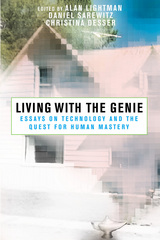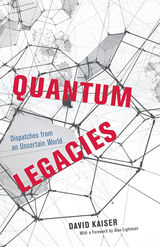

Human ingenuity has granted us a world of unprecedented personal power -- enabling us to communicate instantaneously with anyone anywhere on the globe, to transport ourselves in both real and virtual worlds to distant places with ease, to fill our bellies with engineered commodities once available to only a privileged elite.
Through our technologies, we have sought to free ourselves from the shackles of nature and become its master. Yet science and technology continually transform our experience and society in ways that often seem to be beyond our control. Today, different areas of research and innovation are advancing synergistically, multiplying the rate and magnitude of technological and societal change, with consequences that no one can predict.
Living with the Genie explores the origins, nature, and meaning of such change, and our capacity to govern it. As the power of technology continues to accelerate, who, this book asks, will be the master of whom?
In Living with the Genie, leading writers and thinkers come together to confront this question from many perspectives, including: Richard Powers's whimsical investigation of the limits of artificial intelligence; Philip Kitcher's confrontation of the moral implications of science; Richard Rhodes's exploration of the role of technology in reducing violence; Shiv Visvanathan's analysis of technology's genocidal potential; Lori Andrews's insights into the quest for human genetic enhancement; Alan Lightman's reflections on how technology changes the experience of our humanness.
These and ten other provocative essays open the door to a new dialogue on how, in the quest for human mastery, technology may be changing what it means to be human, in ways we scarcely comprehend.


The ideas at the root of quantum theory remain stubbornly, famously bizarre: a solid world reduced to puffs of probability; particles that tunnel through walls; cats suspended in zombielike states, neither alive nor dead; and twinned particles that share entangled fates. For more than a century, physicists have grappled with these conceptual uncertainties while enmeshed in the larger uncertainties of the social and political worlds around them, a time pocked by the rise of fascism, cataclysmic world wars, and a new nuclear age.
In Quantum Legacies, David Kaiser introduces readers to iconic episodes in physicists’ still-unfolding quest to understand space, time, and matter at their most fundamental. In a series of vibrant essays, Kaiser takes us inside moments of discovery and debate among the great minds of the era—Albert Einstein, Erwin Schrödinger, Stephen Hawking, and many more who have indelibly shaped our understanding of nature—as they have tried to make sense of a messy world.
Ranging across space and time, the episodes span the heady 1920s, the dark days of the 1930s, the turbulence of the Cold War, and the peculiar political realities that followed. In those eras as in our own, researchers’ ambition has often been to transcend the vagaries of here and now, to contribute lasting insights into how the world works that might reach beyond a given researcher’s limited view. In Quantum Legacies, Kaiser unveils the difficult and unsteady work required to forge some shared understanding between individuals and across generations, and in doing so, he illuminates the deep ties between scientific exploration and the human condition.
READERS
Browse our collection.
PUBLISHERS
See BiblioVault's publisher services.
STUDENT SERVICES
Files for college accessibility offices.
UChicago Accessibility Resources
home | accessibility | search | about | contact us
BiblioVault ® 2001 - 2024
The University of Chicago Press









